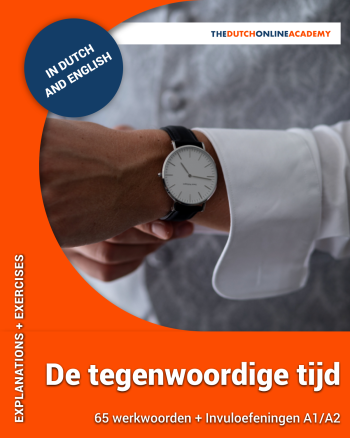Learn the theory

When learning Dutch, the second tense you normally learn after the present tense is het perfectum.
In case you have doubt about when to use the perfect tense or the imperfectum, here we have an article about the differences between perfect and imperfect tenses in Dutch. Do you know the perfect tense but do you need more opportunities to practice? Take a look at our conversation courses.
Really want to dive deep into het perfectum? Take a look at our exercise PDF in our shop.
Let's get started.
What is the present perfect (Het Perfectum)
This present perfect in Dutch is not difficult. Let's look at the regular verb maken (to make):
- Ik heb gemaakt
- Jij hebt gemaakt
- Hij/zij/het heeft gemaakt
- Wij hebben gemaakt
- Jullie hebben gemaakt
- Zij hebben gemaakt
As you can see, you need to use an auxiliary verb (hebben or zijn), conjugate it to the subject and use a past participle.
How do you form the perfect tense in Dutch?
- 1 - Take the first person of the verb ( in case of to make: maak).
- 2 - Put ge before it (gemaak).
- 3 - Find the stem by taking the full verb - en (maken - en = mak)
- 4 - Take a look at the last letter of the stem. Is this letter one of the consonants in PoCKeTFiSH?
- 5a - If it's in PoCKeTFiSH, you write a T (gemaakt).
- 5b - If the letter is not in PoCKeTFiSH you write a D (gebeld).
If the infinitive of a verb starts with ge-, ver-, be- ont-, her-, er- of mis- you don't write an (extra) ge in perfectum:
- ik heb genoten (irregular verb)
- ik ben verhuisd
- ik ben begonnen (irregular verb)
- ik heb onthouden (irregular verb)
- ik heb herhaald
- ik heb erkend
- ik heb misplaatst
You can see that the auxiliary verb can be Zijn or Hebben, depending on the verb we are using or the rest of the sentence. Which takes us to the next step.
When do you use "zijn" instead of "hebben" in present perfect (perfect tense) in Dutch?
As we've seen, you use an auxiliary verb in the perfectum. You will have noticed that for some verbs this is a form of "hebben" and for some verbs, it is "zijn".
Many verbs can go together with both, depending on the use.
Normally "hebben" is used for actions the subject does/carries out. Here are the three reasons to use "zijn" (you can either watch the video or read on)
1. If there is a clear movement towards something, you use a form of “zijn”.
Examples:
- Ik ben naar het bos gewandeld
- Ik heb in het het bos gewandeld.
- Ik ben richting huis gefietst.
- Ik heb in de natuur gefietst.
Since the words “naar” and “richting” suggest a movement towards something, you use ben (zijn).
2. If the state of the subject changes because of the action or if he/she/it undergoes the action instead of doing it (passive sentences)
Examples:
- Ik heb mijn huiswerk gemaakt. (“Ik” does the action, so hebben)
- Het huiswerk is gemaakt. (the homework undergoes the action, the state of the homework has been changed, so zijn)
- Ik heb mijn levensstijl veranderd (“Ik” does the action, so hebben)
- Ik ben veranderd. (“ik” undergoes the action, so zijn).
- Hij heeft het gezien. (“Hij” does the action - he has seen it - so hebben)
- Hij is gezien (“Hij” undergoes the action - he has been seen - so zijn).
- Hij heeft gepest (He has bullied, doing the action)
- Hij is gepest (he has been bullied, undergoing the action)
Note that you can’t use zijn en hebben both for all verbs. You can't undergo a verb like voetballen, you can only do it yourself: it can’t be done to you. So voetballen is always with hebben.
3) Some verbs just always go with “zijn”.
Some verbs always go together with "zijn" in present perfect. Sometimes because they obviously change the state of the subject (2) and sometimes because they relate to movement / direction (1). And some others are a bit less logical. You will have to learn them by heart.
Examples:
- gaan (clearly movement) ik ben gegaan.
- trouwen (clearly change of state) ik ben getrouwd.
- vallen (not that clear, although you could say you undergo it) ik ben gevallen
How to deal with irregular verbs in perfect tense?
It's easy and difficult at the same time: You need to remember them by heart! We made a second video so you can practice the most important ones:
Practice with exercises
Je ziet 10 zinnen. Maak de zinnen af met het perfectum van het verbum tussen haakjes.
Some ideas to keep learning
In case you are in doubt about when to use perfectum or imperfectum, here we have an article about the differences between perfect and imperfect tense in Dutch.
comments
Login to leave a comment
info@thedutchonlineacademy.com
There are a lot of irregular verbs, Michelle. It's a lot of work, but you'll have to study them one by one. Good luck!
If you want to study more: In our webshop you'll find exercise PDFs about the perfect and imperfect tense, including a list of important irregular verbs.
info@thedutchonlineacademy.com
There are a lot of irregular verbs, Michelle. It's a lot of work, but you'll have to study them one by one. Good luck!
If you want to study more: In our webshop you'll find exercise PDFs about the perfect and imperfect tense, including a list of important irregular verbs.


